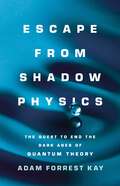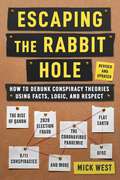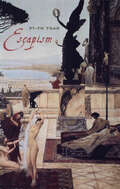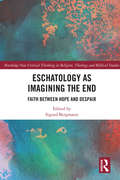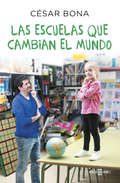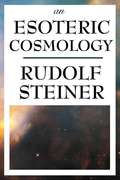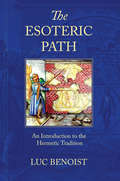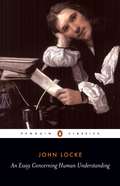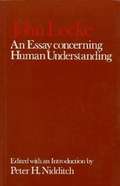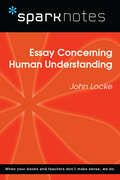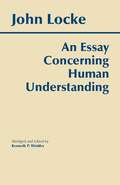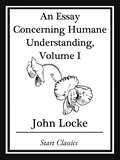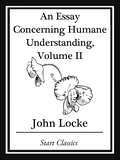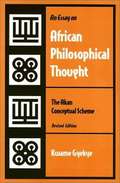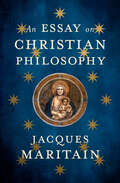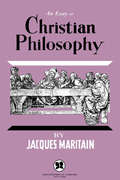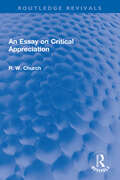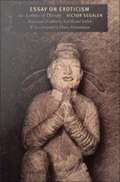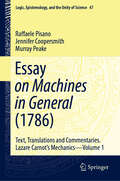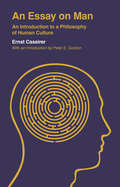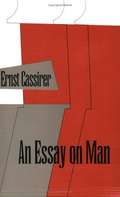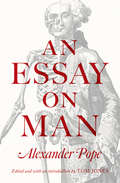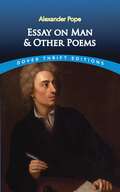- Table View
- List View
Escape from Shadow Physics: The Quest to End the Dark Ages of Quantum Theory
by Adam Forrest KayThis "artfully written...splendid history of classical and quantum physics" (Science) that "rightfully highlights the limitations of current physics" (Wall Street Journal) and argues for a revolutionary new understanding of quantum mechanics The received wisdom in quantum physics is that, at the deepest levels of reality, there are no actual causes for atomic events. This idea led to the outlandish belief that quantum objects—indeed, reality itself—aren&’t real unless shaped by human measurement. Einstein mocked this idea, asking whether his bed spread out across his room unless he looked at it. And yet it remains one of the most influential ideas in science and our culture. In Escape from Shadow Physics, Adam Forrest Kay takes up Einstein&’s torch: reality isn&’t mysterious or dependent on human measurement, but predictable and independent of us. At the heart of his argument is groundbreaking research with little drops of oil. These droplets behave as particles do in the long-overlooked quantum theory of pilot waves; crucially, they showcase quantum behavior while being described by classical physics. And that classical-quantum interface points to a true understanding of quantum mechanics and a reasonable universe. A bold and essential reset of the field, Escape from Shadow Physics describes the kind of true scientific revolution that comes along just once—or less—in a century.
Escaping the Rabbit Hole: How to Debunk Conspiracy Theories Using Facts, Logic, and Respect (Revised and Updated - Includes Information about 2020 Election Fraud, The Coronavirus Pandemic, The Rise of QAnon, and UFOs)
by Mick WestRevised and updated for the first time in 2023—Now includes strategies for debunking conspiracies regarding the coronavirus pandemic, election fraud, QAnon, UFOs, and more. The Earth is flat, the World Trade Center collapse was a controlled demolition, planes are spraying poison to control the weather, and actors faked the Sandy Hook massacre. All these claims are bunk: falsehoods, mistakes, and in some cases, outright lies. But many people passionately believe one or more of these conspiracy theories. They consume countless books and videos, join like-minded online communities, try to convert those around them, and even, on occasion, alienate their own friends and family. Why is this, and how can you help people, especially those closest to you, break free from the downward spiral of conspiracy thinking? In Escaping the Rabbit Hole, author Mick West shares over a decade&’s worth of knowledge and experience investigating and debunking false conspiracy theories through his forum, MetaBunk.org, and sets forth a practical guide to helping friends and loved ones recognize these theories for what they really are. Perhaps counter-intuitively, the most successful approaches to helping individuals escape a rabbit hole aren&’t comprised of simply explaining why they are wrong; rather, West&’s tried-and-tested approach emphasizes clear communication based on mutual respect, honesty, openness, and patience. West puts his debunking techniques and best practices to the test with the most popular false conspiracy theories today (Chemtrails, The Coronavirus Pandemic, 9/11 Controlled Demolition, Election Fraud, False Flags, Flat Earth, The Rising of QAnon, and UFOs)—providing road maps to help you to understand your friend and help them escape the rabbit hole. These are accompanied by real-life case studies of individuals who, with help, were able to break free from conspiracism. With sections on: the wide spectrum of conspiracy theoriesavoiding the &“shill&” labelpsychological factors and other complications(and concluding with) a look at the future of debunking Mick West has put forth a conclusive, well-researched, practical reference on why people fall down the conspiracy theory rabbit hole and how you can help them escape.
Escapism
by Yi-Fu TuanAcclaimed cultural geographer Yi-Fu Tuan considers humanity's enduring desire to escape reality— and embrace alternatives such as love, culture, and DisneyworldIn prehistoric times, our ancestors began building shelters and planting crops in order to escape from nature's harsh realities. Today, we flee urban dangers for the safer, reconfigured world of suburban lawns and parks. According to geographer Yi-Fu Tuan, people have always sought to escape in one way or another, sometimes foolishly, often creatively and ingeniously. Glass-tower cities, suburbs, shopping malls, Disneyland—all are among the most recent monuments in our efforts to escape the constraints and uncertainties of life—ultimately, those imposed by nature. "What cultural product," Tuan asks, "is not escape?" In his new book, the capstone of a celebrated career, Tuan shows that escapism is an inescapable component of human thought and culture.
Eschatology as Imagining the End: Faith between Hope and Despair (Routledge New Critical Thinking in Religion, Theology and Biblical Studies)
by Sigurd BergmannAs society becomes more concerned with the future of our planet, the study of apocalypse and eschatology become increasingly pertinent. Whether religious or not, peoples’ views on this topic can have a profound effect on their attitudes to issues such as climate change and social justice and so it cannot be ignored. This book investigates how different approaches in historical and contemporary Christian theology make sense in reflecting about the final things, or the eschata, and why it is so important to consider their multi-faceted impact on our lives. A team of Nordic scholars analyse historical and contemporary eschatological thinking in a broad range of sources from theology and other related disciplines, such as moral philosophy, art history and literature. Specific social and environmental challenges, such as the Norwegian Breivik massacre in 2011, climatic change narratives and the ambiguity of discourses about euthanasia are investigated in order to demonstrate the complexity and significance of modes of thinking about the end times. This book addresses the theology of the end of the world in a more serious academic tone than it is usually afforded. As such, it will be of great interest to academics working in eschatology, practical theology, religious studies and the philosophy of religion.
Las escuelas que cambian el mundo
by César BonaEl nuevo libro de César Bona nos invita a conocer de primera mano algunos de los casos maravillosos que están teniendo lugar en el ámbito educativo español, excelentes ejemplos de que la educación de nuestros hijos, la forma de enseñarles, puede hacerse de otra manera y, lo mejor de todo: funciona. Hay escuelas en España que están cambiando la educación. Escuelas que no están en Finlandia ni en Suecia; unas son públicas, otras rurales y algunas incluso están masificadas. Todas ellas son «Escuelas Changemaker» y están preparadas para liderar una verdadera transformación educativa. César Bona ha viajado por siete ciudades y pueblos siguiendo el camino de algunas de las escuelas que están luchando para que cada niño, niña y joven tenga la oportunidad de convertirse en un agente de cambio. Son lugares que cuentan con alumnos motivados, maestros corrientes, y padres cómplices detrás. Escuelas excelentes académicamente y conun proyecto integral donde el respeto, la creatividad, la imaginación, el trabajo en equipo, la empatía y la interacción con la sociedad son el mejor camino para completar las enseñanzas de las asignaturas tradicionales. César Bona nos narra, con su personal y cercana voz, lo que han logrado estas escuelas, lo novedoso de sus métodos y cómo todos, sea cual sea nuestra edad, podemos cambiar el mundo. No olvidemos que los niños no son los adultos del mañana, son los niños del presente y ellos, si les dejamos ser niños, si les reforzamos su creatividad natural, su imaginación desbordante y trabajamos la empatía, la solidaridad y el respeto, pueden cambiar el mundo. No en el futuro, sino ahora. Porque una nueva educación no es un sueño, es una realidad.
An Esoteric Cosmology
by Rudolf SteinerIt is only of recent times that the truths of occultism have been the subject of public lectures. Formerly, these truths were only revealed in secret societies, to those who had passed through certain degrees of initiation and had sworn to obey the laws of the Order through the whole of their life. Today, man is entering upon a very critical period. Occult truths are beginning to be disclosed to the public. In a matter of twenty years or so, a certain number of them will already be common knowledge. Why is this? The reason is that humanity is entering upon a new phase which it is the object of this lecture to explain.
The Esoteric Path: An Introduction to the Hermetic Tradition
by Luc BenoistThe Estoric path firmly situates that path in its appropriate, traditional context, and point him or her in the right direction, away from the time-and soul-consuming attractions of those 'paths' that exhibit 9in the author's word) 'the confusion between the spiritual and the psychic...the identification of the spiritual with what is most inferior in the psyche, the identification of religion with magic, totemism, and even sorcey, the popular dissemination of pseudo- or counter-initiatic rituals.'
An Essay Concerning Human Understanding
by John LockeIn An Essay Concerning Human Understanding, first published in 1690, John Locke (1632-1704) provides a complete account of how we acquire everyday, mathematical, natural scientific, religious and ethical knowledge. Rejecting the theory that some knowledge is innate in us, Locke argues that it derives from sense perceptions and experience, as analysed and developed by reason. While defending these central claims with vigorous common sense, Locke offers many incidental - and highly influential - reflections on space and time, meaning, free will and personal identity. The result is a powerful, pioneering work, which, together with Descartes's works, largely set the agenda for modern philosophy.
An Essay Concerning Human Understanding
by John LockeA foundational text in Western philosophy, this essay discusses the ways in which humans develop and learn.
An Essay Concerning Human Understanding
by John Locke Peter H. NidditchPublished in 1689, John Locke's pioneering investigation into the origins, certainty, and extent of human knowledge set the groundwork for modern philosophy and influenced psychology, literature, political theory, and other areas of human thought and expression.
Essay Concerning Human Understanding (SparkNotes Philosophy Guide)
by SparkNotesEssay Concerning Human Understanding (SparkNotes Philosophy Guide) Making the reading experience fun! SparkNotes Philosophy Guides are one-stop guides to the great works of philosophy–masterpieces that stand at the foundations of Western thought. Inside each Philosophy Guide you&’ll find insightful overviews of great philosophical works of the Western world.
An Essay Concerning Human Understanding
by Kenneth P. Winkler John LockeIncludes generous selections from the Essay, topically arranged passages from the replies to Stillingfleet, a chronology, a bibliography, a glossary, and an index based on the entries that Locke himself devised.
An Essay Concerning Humane Understanding, Volume I
by John LockeJohn Locke is widely regarded as the father of classical liberalism. This essay was groundbreaking in its approach to foundation of human knowledge and understanding, he describes the mind at birth as a blank slate filled later through experience, the essay became the principle sources of empiricism in modern philosophy and influenced many enlightenment philosophers. Many of the earliest books, particularly those dating back to the 1900s and before, are now extremely scarce and increasingly expensive.
An Essay Concerning Humane Understanding, Volume II
by John LockeJohn Locke is widely regarded as the father of classical liberalism. This essay was groundbreaking in its approach to foundation of human knowledge and understanding, he describes the mind at birth as a blank slate filled later through experience, the essay became the principle sources of empiricism in modern philosophy and influenced many enlightenment philosophers. Many of the earliest books, particularly those dating back to the 1900s and before, are now extremely scarce and increasingly expensive.
An Essay for Ezra: Racial Terror in America (Thinking Theory)
by Grant FarredAn intensely personal, and philosophical, account of why white America&’s racial unconscious is not so unconsciousAn Essay for Ezra is a critique of terror that begins but by no means ends with the presidency of Donald J. Trump. A father addresses his son and a boy shares his observations in a dynamic dialogistic exchange that is a commentary of and for its time, taking the measure of racial terror and of white supremacy both in our moment and as a historical phenomenon.Framed through the experiences of the author&’s biracial son, An Essay for Ezra is intensely personal while also powerfully universal. Drawing on the social and political thought of James Baldwin and Martin Luther King, Grant Farred examines the temptation and the perils of essentialism and the need to discriminate—to engage the black mind as much as the black body. With that dialectic as his starting point, Farred engages the ideas of Jameson, Barthes, Derrida, Adorno, Kant, and other thinkers to derive an ethics of being in our time of social peril. His antiessentialist racial analysis is salient, especially when he deploys Dave Chappelle as a counterpoint to Baldwin—and Chappelle&’s brilliant comic philosophic voice jabs at both racial and gender identity.Standing apart for its willingness to explore terror in all its ambivalence, this theoretical reflection on racism, knowledge, ethics, and being in our neofascist present brings to bear the full weight of philosophical inquiry and popular cultural critique on black life in the United States.
An essay on African philosophical thought The Akan conceptual scheme (Revised edition)
by Kwame GyekyeDefining the main principles of a distinct African philosophy, this work rejects the idea that an African philosophy consists simply of the work of Africans writing on philosophy. It argues that critical analyses of specific traditional African modes of thought are necessary to develop a distinctively African philosophy.
An Essay on Christian Philosophy
by Jacques MaritainThis important essay by the French Catholic philosopher articulates the foundation for his influential interpretations of Thomas Aquinas. Known for his influential writings that brought fresh relevance to the work of Thomas Aquinas, Jacques Maritain was one of the most important Catholic philosophers of the twentieth century. Although An Essay on Christian Philosophy is not generally considered to be among his major works, it is, in a sense, the key to unlocking his massive synthesis of modern Thomism. This provocative essay reveals the inner springs of Maritain&’s ideas concerning mankind&’s relationship to God. This lucid translation by Edward H. Flannery includes a glossary of technical terms, making it even more accessible for the general reader.
An Essay on Christian Philosophy
by Jacques MaritainThis original translation, by Edward H. Flannery, brings you one of Maritain's most eye-opening studies of Christianity. Although not his most famous work, Maritain's An Essay on Christian Philosophy provides readers with an in-depth analysis and careful philosophical approach to the study of theology and, at the time of original publication, was considered to be the definitive statement of the Thomistic position. Discover his theses for yourself as Maritain considers the nature of philosophy, morality, and their relations to Christianity with clarity and a scholarly attention to detail. Flannery provides English readers with a glossary of terms to bring further understanding to Maritain's original words. Jacques Maritain was a French Catholic philosopher and political thinker. He was born in Paris in 1882, where he spent most of his life. His father was a prominent lawyer and his mother the daughter of a statesman. He attended the Sorbonne to study philosophy and natural science, and after marrying, he and his wife converted to Catholicism. It was after this he became a well-known scholar of St. Thomas Aquinas and Thomistic philosophy. He published widely on philosophical and political thought, and by the 1930s, he was an established thinker in the Catholic community. After the outbreak of WWII, Maritain relocated to the United States, where he taught at Princeton University and Columbia University. Later in life, he and his wife returned to France, where he continued to write and study Catholic scholarship until his death in 1973.
An Essay on Critical Appreciation (Routledge Revivals)
by Ralph W. Church dec'dFirst published in 1938, An Essay on Critical Appreciation aims to provide a language suited for the explication on beauty. This explication is not based merely on emotion but is motivated by contemplation and discrimination. By virtue of being rendered in a discourse, an appreciation can claim to be critical or discriminating and ‘beauty’ can be said to have characteristics. The search of such a language takes the author through the contemplation on the meaning of ‘beauty’, entertaining contrary views, and reaching at an understanding of the aesthetic situation. This book will be of interest to students of English literature, philosophy and art.
Essay on Exoticism: An Aesthetics of Diversity
by Victor SegalenThe "Other"--source of fear and fascination; emblem of difference demonized and romanticized. Theories of alterity and cultural diversity abound in the contemporary academic landscape. Victor Segalen's early attempt to theorize the exotic is a crucial reference point for all discussions of alterity, diversity, and ethnicity. Written over the course of fourteen years between 1904 and 1918, at the height of the age of imperialism, Essay on Exoticism encompasses Segalen's attempts to define "true Exoticism. " This concept, he hoped, would not only replace nineteenth-century notions of exoticism that he considered tawdry and romantic, but also redirect his contemporaries' propensity to reduce the exotic to the "colonial. " His critique envisions a mechanism that appreciates cultural difference--which it posits as an aesthetic and ontological value--rather than assimilating it: "Exoticism's power is nothing other than the ability to conceive otherwise," he writes. Segalen's pioneering work on otherness anticipates and informs much of the current postcolonial critique of colonial discourse. As such Essay on Exoticism is essential reading for both cultural theorists or those with an interest in the politics of difference and diversity.
Essay on Machines in General: Text, Translations and Commentaries. Lazare Carnot's Mechanics - Volume 1 (Logic, Epistemology, and the Unity of Science #47)
by Raffaele Pisano Jennifer Coopersmith Murray PeakeThis book offers insights relevant to modern history and epistemology of physics,mathematics and, indeed, to all the sciences and engineering disciplines emergingof 19th century. This research volume is the first of a set of three Springer books onLazare Nicolas Marguérite Carnot’s (1753–1823) remarkable work: Essay on Machines inGeneral (Essai sur les machines en général [1783] 1786). The other two forthcomingvolumes are: Principes fondamentaux de l’équilibre et du mouvement (1803) andGéométrie de position (1803).Lazare Carnot – l'organisateur de la victoire – in Essai sur le machine en général (1786)assumed that the generalization of machines was a necessity for society and its economicdevelopment. Subsequently, his new coming science applied to machines attractedconsiderable interest for technician, as well, already in the 1780’s. With no lack inrigour, Carnot used geometric and trigonometric rather than algebraic arguments, andusually went on to explain in words what the formulae contained. His main physical–mathematical concepts were the Geometric motion and Moment of activity–concept ofWork . In particular, he found the invariants of the transmission of motion (by statingthe principle of the moment of the quantity of motion) and theorized the condition ofthe maximum efficiency of mechanical machines (i.e., principle of continuity in thetransmission of power).While the core theme remains the theories and historical studies of the text, the bookcontains an extensive Introduction and an accurate critical English Translation –including the parallel text edition and substantive critical/explicative notes – of Essaisur les machines en général (1786). The authors offer much-needed insight into therelation between mechanics, mathematics and engineering from a conceptual, empiricaland methodological, and universalis point of view. As a cutting–edge writing byleading authorities on the history of physics and mathematics, and epistemologicalaspects, it appeals to historians, epistemologist–philosophers and scientists (physicists, mathematicians and applied sciences and technology).
An Essay on Man: An Introduction to a Philosophy of Human Culture (Veritas Paperbacks)
by Ernst CassirerOne of the twentieth century&’s greatest philosophers presents the results of his lifetime study of man&’s cultural achievementsAn Essay on Man is an original synthesis of contemporary knowledge, a unique interpretation of the intellectual crisis of our time, and a brilliant vindication of man&’s ability to resolve human problems by the courageous use of his mind. In a new introduction Peter E. Gordon situates the book among Cassirer&’s greater body of work, and looks at why his &“hymn to humanity in an inhuman age&” still resonates with readers today. &“The best-balanced and most mature expression of [Cassirer&’s] thought.&”—Journal of Philosophy &“No reader of this book can fail to be struck by the grandeur of its program or by the sensitive humanism of the author.&”—Ernest Nagel, The Humanist &“A rare work of philosophy and a rare work of art.&”—Tomorrow
An Essay on Man: An Introduction to a Philosophy of Human Culture
by Ernst CassirerCassirer explores the question "what is man?" and explores man in terms of his human culture.
An Essay on Man
by Tom Jones Alexander PopeVoltaire called it "the most sublime didactic poem ever written in any language." Rousseau rhapsodized about its intellectual consolations. Kant recited long passages of it from memory during his lectures. And Adam Smith and David Hume drew inspiration from it in their writings. This was Alexander Pope's Essay on Man (1733-34), a masterpiece of philosophical poetry, one of the most important and controversial works of the Enlightenment, and one of the most widely read, imitated, and discussed poems of eighteenth-century Europe and America. This volume, which presents the first major new edition of the poem in more than fifty years, introduces this essential work to a new generation of readers, recapturing the excitement and illuminating the debates it provoked from the moment of its publication.Echoing Milton's purpose in Paradise Lost, Pope says his aim in An Essay on Man is to "vindicate the ways of God to man"--to explain the existence of evil and explore man's place in the universe. In a comprehensive introduction, Tom Jones describes the poem as an investigation of the fundamental question of how people should behave in a world they experience as chaotic, but which they suspect to be orderly from some higher point of view. The introduction provides a thorough discussion of the poem's attitudes, themes, composition, context, and reception, and reassesses the work's place in history. Extensive annotations to the text explain references and allusions.The result is the most accessible, informative, and reader-friendly edition of the poem in decades and an invaluable book for students and scholars of eighteenth-century literature and thought.
Essay on Man and Other Poems: And Other Poems (Dover Thrift Editions)
by Alexander PopeConsidered the preeminent verse satirist in English, Alexander Pope (1688-1744) brought wide learning, devastating wit and masterly technique to his poems. Models of clarity and control, they exemplified the classical poetics of the Augustan age.This volume contains a rich selection of Pope's work, including such well-known poems as the title selection — a philosophical meditation on the nature of the universe and man's place in it — and "The Rape of the Lock," a mock-epic of rare charm and skill. Also included are "Ode on Solitude," "The Dying Christian to His Soul," "Elegy to the Memory of an Unfortunate Lady," "An Essay on Criticism," "Epigram Engraved on the Collar of a Dog," "Epistle [IV] to Richard Boyle, Earl of Burlington: Of the Use of Riches," "Epistle to Dr. Arbuthnot; or, Prologue to the Satires" and more.Taken together, these poems offer an excellent sampling of Pope's imaginative genius and the felicitous blending of word, idea and image that earned him a place among the leading lights of 18th-century literature.
